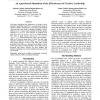Free Online Productivity Tools
i2Speak
i2Symbol
i2OCR
iTex2Img
iWeb2Print
iWeb2Shot
i2Type
iPdf2Split
iPdf2Merge
i2Bopomofo
i2Arabic
i2Style
i2Image
i2PDF
iLatex2Rtf
Sci2ools
CORR
2010
Springer
2010
Springer
An Agent-based Simulation of the Effectiveness of Creative Leadership
This paper investigates the effectiveness of creative versus uncreative leadership using EVOC, an agent-based model of cultural evolution. Each iteration, each agent in the artificial society invents a new action, or imitates a neighbor's action. Only the leader's actions can be imitated by all other agents, referred to as followers. Two measures of creativity were used: (1) invention-to-imitation ratio, iLeader, which measures how often an agent invents, and (2) rate of conceptual change, cLeader, which measures how creative an invention is. High iLeader increased mean fitness of ideas, but only when creativity of followers was low. High iLeader was associated with greater diversity of ideas in the early stage of idea generation only. High cLeader increased mean fitness of ideas in the early stage of idea generation; in the later stage it decreased idea fitness. Reasons for these findings and tentative implications for creative leadership in human society are discussed.
| Added | 09 Dec 2010 |
| Updated | 09 Dec 2010 |
| Type | Journal |
| Year | 2010 |
| Where | CORR |
| Authors | Stefan Leijnen, Liane Gabora |
Comments (0)

